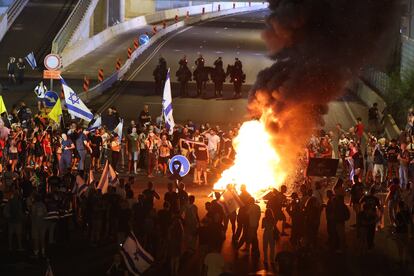Banks, ports, factories, and universities in Israel halted their activities on Monday as part of the first strike held against the government of Benjamin Netanyahu in almost 11 months of war. The strike was hastily called the day before by the main trade union, Histadrut, in the face of unprecedented outrage over the discovery in a Gaza tunnel of the bodies of six hostages, who might have been returned alive under a new ceasefire similar to the one agreed last year and which Netanyahu has been putting a spanner in the works since December. The strike began at 05:00 local time and was expected to last 24 hours but at midday a court ordered it to end, considering it “political” and “unrelated” to the issue for which it had been called. Histadrut chairman Arnon Bar-David announced to the labor court that he was considering a petition to suspend it that would end the action at 6:00 p.m. However, the court ordered the strike to end at 2:30 pm and Bar-David responded by urging workers to return to their posts.
During its short duration, the strike failed to paralyze Israel. Adherence to the action depended very much on the locality, the sector, and the strength of each union branch in its struggle with the authorities governed by Likud, Netanyahu’s party. For example, most banks and universities joined in and, in general, large private sector companies and the state electricity company and postal service.
Reaction to the strike was even at the country’s ports and the municipal bus companies in Tel Aviv and Jerusalem only downed tools for the first six hours of the day. The primary schools (the secondary schools were already on strike due to a wage dispute), joined the strike but reopened at midday. The light rail system continued to operate in Israel’s third city, Haifa.
An important thermometer of the take-up was Tel Aviv’s Ben Gurion International Airport, which handles the vast majority of arrivals and departures by air. After hours of pressure on Sunday, the strike ended up being limited to two hours, from 8 am to 10 am, and only for takeoffs, without preventing landings. Histadrut and the Ministry of Transport — headed by one of the most right-wing Likud ministers, Miri Regev — maintained a tussle after that hour due to continued delays long queues amid strategies such as stopping check-in and baggage collection at the counters. Only seven flights to the United States departed before the court order came into effect.
During the action, the chairman of the Histadrut’s Public Relations department, Yaniv Levy, put the number of local authorities on strike at 95% and opened the door to new calls including more sectors. On Sunday, the far-right Minister of Finance Bezalel Smotrich, who opposes a ceasefire agreement because he considers it a “surrender” to Hamas, affirmed that Monday’s strike “fulfills the dreams” of the Palestinian fundamentalist organization’s new political leader, Yahya Sinwar, who replaced Ismail Haniyeh after the latter’s assassination in Iran in July. Smotrich also ordered the Treasury Department to make sure the day’s pay was deducted from the salaries of those who did not show up for work.
Despite its mixed success, Monday’s action was the first strike against the Netanyahu government since March 2023, staged over the prime minister’s controversial and divisive judicial reform, following two weeks of accumulated grievances and the return of 12 Israeli hostages in coffins. According to the autopsies, as reported by local media, the last six were killed with point-blank shots, some 48 to 72 hours before their discovery Sunday in a tunnel on the Strip. That is to say, their captors apparently executed them and fled when they realized that Israeli soldiers had discovered their whereabouts and were about to try and launch a rescue attempt. Only Bedouin Qaid Farhan Alkadi, an Israeli Muslim, has been found alive by troops this month.

The 12 Jewish Israelis found dead in Gaza over the course of just a few days have further undermined Netanyahu’s mantra that increased military pressure will bring about a ceasefire agreement more swiftly and led to some 500,000 people — around 5% of the country’s population — taking to the streets in 40 towns on Sunday. Most demonstrated in Tel Aviv, where urban youth, residents of nearby kibbutzim, and veterans of the 1973 Yom Kippur War gathered to chant slogans such as “All [hostages] now!” “Agreement now! Why are they still in Gaza!” or “You are the leader, you are guilty!” in reference to Netanyahu.
The Histadrut chairman, aware — as he admitted on the podium — that he was only now responding to months of pressure to bring the country to a standstill, insisted that the most important thing is to achieve a ceasefire that brings back the 101 hostages still being held in Gaza, of whom the Israeli army has confirmed some 30 as deceased. “Jews do not abandon Jews, what is not clear about this? It makes no sense for our children to die in tunnels for political considerations […] The country is on the road to political ruin,” Bar-Davod said. Histadrut, reluctant to call the strike, had been negotiating with the Ministry of Finance for a wage improvement in its contracts.
Eighteen people remain in police custody over the protests in Tel Aviv. They were not arrested during the general demonstration but at around midnight Sunday, when several thousand people managed to break through the police cordon and cut off the Ayalon ring road. The police, some of them on horseback, used water cannons and sound grenades to disperse them.

Those protesters were mostly young people, who lit bonfires and set up barricades in the middle of the road, chanting slogans such as “Bibi kills the hostages,” “Police, who are you protecting you?” or “[Itamar] Ben-Gvir is a terrorist,” referring to the ultra-right Security Minister. Scuffling with protesters who refused to move or who confronted the police was constant during the three-hour blockade of the Ayalon highway.
Sign up for our weekly newsletter to get more English-language news coverage from EL PAÍS USA Edition
#Israels #antiNetanyahu #strike #ends #early #fails #bring #country #standstill